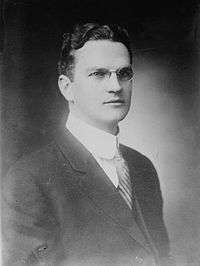William Trufant Foster

William Trufant Foster (January 18, 1879 – October 8, 1950), was an American educator and economist, whose theories were especially influential in the 1920s. He was the first president of Reed College.
Career
Foster was born in Boston, Massachusetts on January 18, 1879. He graduated from Harvard University with an A.B. in 1901 and an A.M., 1904. Foster was an instructor of English at Bates College in Maine, from 1901–03 and served as a coach of Bates' internationally known debate program. Foster was also professor of English and Argumentation at Bowdoin College in Maine in 1905. He authored "Argumentation and Debating", published in 1908. Foster eventually received a Ph.D. in 1911 from Teachers College, Columbia University. His conception of "the ideal college" set out in the concluding chapter of his dissertation, led to his appointment as the first president of Reed College, 1911–1919. He rejected intercollegiate sports and fostered close intellectual collaboration between faculty and students. He was director (1920–1950) of the Pollak Foundation of Economic Research, in Newton, Massachusetts, where he emphasized the need to protect consumer interests.
Economics
He collaborated with his Harvard classmate Waddill Catchings in a series of economics books that were highly influential in the United States in the 1920s. His influential books, written with Catchings, were Money (1923), Profits (1925), Business Without a Buyer (1927), The Road to Plenty (1928), and Progress and Plenty (1930).
With Catchings, he was one of the leading pre-Keynesian economists, in the underconsumptionist tradition, advocating similar issues to Keynes such as the paradox of thrift and economic interventionism. The two are now rarely mentioned in contemporary economics texts, standing as they do in the shadow of Keynes's The General Theory.
Foster and Catchings rejected traditional laissez-faire economics and called for aggressive federal involvement to balance the economy lest destabilizing forces upset prosperity. The main problem was underconsumption, which could be overcome by strategic government spending in public works. The theory strongly influenced the anti-depression programs of Herbert Hoover, and Franklin D. Roosevelt, as well as Federal Reserve Board Chairman Marriner Eccles.
References
- Barber, William J. (1985). From New Era to New Deal: Herbert Hoover, the Economists, and American Economic Policy, 1921–1933. New York: Cambridge University Press. ISBN 0-521-30526-8.
- Dorfman, Joseph (1959). The Economic Mind in American Civilization. 4. New York: Viking Press. pp. 339–351.
- Gleason, Alan H. (1959). "Foster and Catchings: A Reappraisal". Journal of Political Economy. 67 (2): 156–172. JSTOR 1825391. doi:10.1086/258158.
External links
| Wikiquote has quotations related to: William Trufant Foster |
| Wikisource has original text related to this article: |
- Works by William T. Foster at Project Gutenberg
- Works by or about William Trufant Foster at Internet Archive
- Should Students Study? at Wikisource
- Should Students Study? hosted by Harper's Magazine
- Reed Magazine: What's so funny 'bout communism, atheism, and free love? (1/8)
- William Trufant Foster edited and contributed three chapters to "The Social Emergency: Studies in Sex Hygiene and Morals". The work was based on an extension course given at Reed College.
- Reed College Oral History Project Time Line